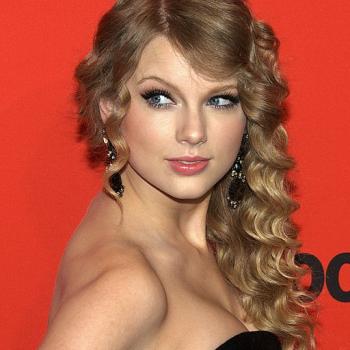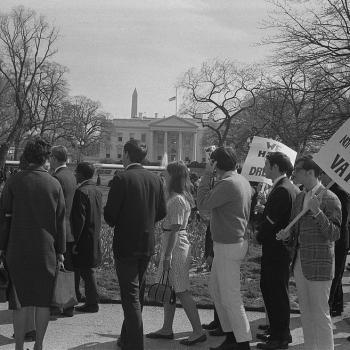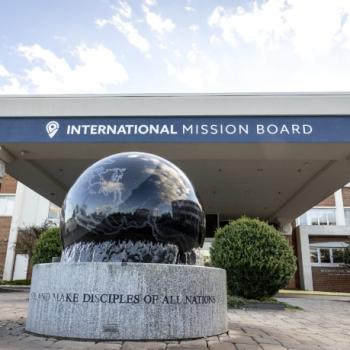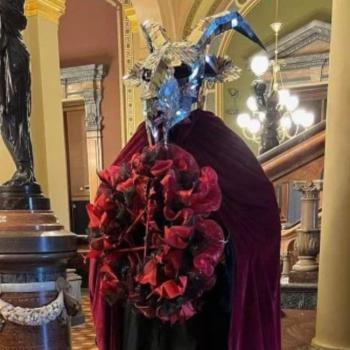From time to time, my propensity for dabbling has led me to write about the intersection of sports and Christianity. (For example, last summer I looked into the religious history of the Olympics.) But if you want to learn from a real expert on that combination of topics, then check out Paul Putz’s new blog, Sportianity (a term coined in 1976 by sportswriter Frank Deford). A doctoral student at Baylor University who also blogs for Religion in American History, Paul was kind enough to answer a few questions about Sportianity and his larger interest in sports history.
As you mean it at the new blog, “Sportianity” describes “the unique cultural world that stands at the intersection of sports and (mostly evangelical Protestant) Christianity.” What are a couple of significant ways that that world has changed since Frank Deford coined “Sportianity” in 1976?
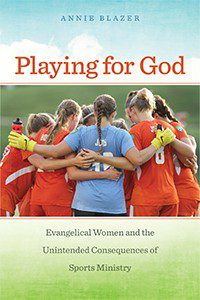 The most significant change is the increasing involvement of women in sports. In 1976 Title IX had recently become law and the FCA had just hired its first director of women’s ministry. Over the next few decades the participation of women in both organized competitive sports and in sports ministry organizations like the FCA exploded. Annie Blazer’s Playing for God: Evangelical Women and the Unintended Consequences of Sports Ministry (2015) is a good ethnographic exploration of this phenomenon, but I think there is room for much more work on the subject.
The most significant change is the increasing involvement of women in sports. In 1976 Title IX had recently become law and the FCA had just hired its first director of women’s ministry. Over the next few decades the participation of women in both organized competitive sports and in sports ministry organizations like the FCA exploded. Annie Blazer’s Playing for God: Evangelical Women and the Unintended Consequences of Sports Ministry (2015) is a good ethnographic exploration of this phenomenon, but I think there is room for much more work on the subject.
A second change is in the racial demographics of Sportianity. The FCA was racially integrated from the beginning—after all, Branch Rickey, the man who signed Jackie Robinson, was one of the founders. But into the 1970s most of the leaders and members of sports ministry organizations were white. While the racial composition of sports ministry organizations still skews white when compared to the demographics of major college and professional sports, sports ministries today are more racially diverse than most Christian denominations and organizations in the United States. Thus, sports provides one of the few cultural spaces in the United States where interracial religious fellowship regularly occurs.
Finally, while my dissertation is focused on the United States, there is a global dimension to Sportianity that deserves more exploration. Athletes in Action, Venture for Victory/Sports Ambassadors, and others have always emphasized global evangelism through sport. They continue those efforts today. Meanwhile, the FCA, which confined its work to the United States for its first few decades, has expanded globally in recent decades.
Much of what you plan for the new blog is biographical: reviews of “biographies or autobiographies that focus on the faith of famous athlete and coaches” and your own vignettes about “famous athletes from the past who were public about their faith.” Is there a Sportianity biography that you wish you had written? Which Christian athlete or coach’s life story hasn’t yet received that treatment from a historian or biographer, but should?
On the one hand, many successful sports figures have already received a biography of some sort. But those biographies are often written by journalists or sports enthusiasts; they’re usually not written with the methods of academic history nor with a focus on religion. Because of that, the field for religious biographies of Christian athletes/coaches is wide open.
I would love to see a biography of legendary Tennessee basketball coach Pat Summitt that focused on her faith. I think it would provide a fascinating lens into the place of Christianity within the rise of big-time women’s college basketball. Dan Towler, an All-Pro running back for the Los Angeles Rams in the 1950s, would be a great subject as well. After his NFL career Towler became a Methodist minister. He was the most prominent African American leader within the FCA for its first two decades—including at the height of the civil rights movement in the 1960s.
Former North Carolina basketball coach Dean Smith and pioneering football coach Amos Alonzo Stagg have both received biographical treatments, but I think they would be excellent subjects for a religious biography. The sources are there for Stagg, but with Summitt, Towler, and Smith, the problem would be getting access to personal papers that would provide the depth to sustain a book.
How’d you come by your historical interest in the intersection of sports and religion?
I’ve always loved playing, watching, and reading about sports. Growing up I devoured books on the history of football, basketball, and baseball. But reading about sports history back then was distinct from learning about history in school. I did the former because I loved it; the latter because I wanted a good grade. In high school my intellectual curiosity about sports really developed through journalism more than history or social studies classes. I grew up in a small town where high school journalism programs are a luxury. But we had an amazing journalism teacher. She built an award-winning student newspaper program at our school, and she taught me and hundreds of others how to cultivate curiosity, how to write, and how to think critically. I was on the sports beat at the newspaper, which gave me an opportunity to channel my interest in sports into writing.
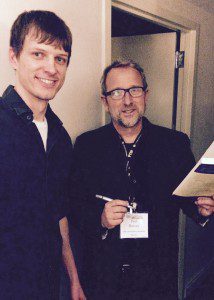
I also played basketball throughout high school. When I went to college I dropped the sport, but I really missed being involved in the game and being on a team. So I scrapped my original college major (journalism) and transferred to a smaller school where I could play basketball, get a degree in secondary education, and become a high school social studies teacher and coach. As I was getting my degree in education, my interest in the discipline of history grew and the attraction of coaching diminished. By the time I graduated from college and became a high school teacher, I realized I no longer wanted to coach. Instead, I enrolled in a master’s program in history, teaching high school during the day and attending classes at night. During that time I stumbled across the Religion in American History blog. Being involved in that online community really channeled my scholarly interests in the direction of religion (more specifically for me, towards American Protestantism).
When I enrolled in Baylor’s history PhD program, my plan was to write about social Christianity in the Midwest. As much as I loved sports, I did not think of it as a “serious” historical subject. None of the historians I knew wrote about it, so it didn’t really seem like an option. I spent my two years of PhD coursework writing seminar papers geared towards a dissertation about social Christianity. At the same time, however, being a full-time graduate student allowed me to read and pursue intellectual interests that I did not have time for when I was teaching high school. After I read John Turner’s book on Campus Crusade for Christ, I couldn’t help but think about the history of the parachurch group that I had been involved with in high school, the Fellowship of Christian Athletes (FCA). Learning about the FCA’s history became a side obsession of sorts —it was founded in 1954, and historically it was the most important sports ministry organization in the US. As I started to think about writing a history of the FCA I connected with a couple other scholars working on sports and religion topics, and they provided encouragement and inspiration. Still, at least two things had to happen before I could switch dissertation topics: I needed to find and get access to archival sources that could adequately ground a historical study of the FCA, and I had to convince my adviser that switching dissertation topics was, if not advisable, at least allowable.
Once I met those conditions, I made the switch.
I’d guess that at least some of our readers are surprised that sports history is a serious academic field. When did sports history come into its own, and has religion always been an important category within it?
I should preface my response here by saying that I am a relative newcomer to the field of sports history. I have a decent grasp of its contours, but I’m continually learning more as I work through my dissertation.
In the eyes of some historians, sports history has probably yet to “come into its own.” That’s a shame, because there is some absolutely outstanding historical work in the field. But even if it is still viewed in some quarters as the junior varsity history team, it was in the early 1970s that sport history really developed an academic identity. That’s when the North American Society of Sport History was founded and when it began to publish the Journal of Sport History. Both of those entities emerged from scholars connected to physical education and kinesiology departments, although scholars with appointments in history departments quickly joined as well. The interdisciplinary nature and the physical education/kinesiology roots of the NASSH/JSH make it unique compared to many other history subfields.
The 1960s/1970s also witnessed the “cultural turn” in history, which made it more acceptable to view lowbrow cultural expressions, including sports, as subjects of serious inquiry. Influential scholars like C.L.R. James (using cricket as a lens into colonialism and decolonization), Clifford Geertz (analyzing cockfighting as a “ritual text”), and Warren Susman (examining Babe Ruth as a 1920s “culture hero”) used sports in their work. None of those three identified as a sport historian, although they pioneered methodologies and modes of inquiry subsequently adopted by some in the field.
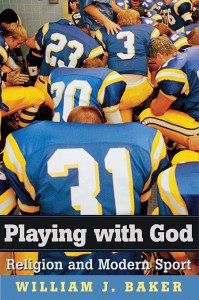 Meanwhile, in the 1970s and 1980s a cadre of self-identified historians of sport began to produce standout historical work. I wish I could say that they completely ignored religion, and that my dissertation is unprecedented in connecting sport and religion. But the truth is that quite a few of these pioneering scholars emphasized religion in their work, in particular Benjamin Rader, Allen Guttmann, and William Baker. In my view Baker’s book Playing With God: Religion and Modern Sport (2007) is the single best historical overview of the intersection of religion and sports in the United States. In the 1980/1990s, too, there was a real flowering of historical scholarship on American Judaism and sports. I’d argue that the richest subset of historical work on sports and religion is focused on Jewish communities and Jewish identity. New work on that subject has continued into the present decade—one of the best recent books on sports and religion is Rebecca Alpert’s Out of Left Field: Jews and Black Baseball (2011).
Meanwhile, in the 1970s and 1980s a cadre of self-identified historians of sport began to produce standout historical work. I wish I could say that they completely ignored religion, and that my dissertation is unprecedented in connecting sport and religion. But the truth is that quite a few of these pioneering scholars emphasized religion in their work, in particular Benjamin Rader, Allen Guttmann, and William Baker. In my view Baker’s book Playing With God: Religion and Modern Sport (2007) is the single best historical overview of the intersection of religion and sports in the United States. In the 1980/1990s, too, there was a real flowering of historical scholarship on American Judaism and sports. I’d argue that the richest subset of historical work on sports and religion is focused on Jewish communities and Jewish identity. New work on that subject has continued into the present decade—one of the best recent books on sports and religion is Rebecca Alpert’s Out of Left Field: Jews and Black Baseball (2011).
When you’re not blogging, you’re working on your dissertation. What are you researching, and why might Anxious Bench readers find it interesting?
My blogging is really a window into the things that I am researching. I have to keep the best stuff for my dissertation, but most of the pieces that I post at Sportianity are things that I’ve come across during dissertation research.
I first envisioned my dissertation as a cultural/institutional history of the Fellowship of Christian Athletes. But I’m no longer as interested in tracing the FCA’s institutional history. Rather my focus is on (1) uncovering the pre-1945 roots of the FCA’s (and its competitors’) sports-friendly brand of Christianity, (2) explaining how and why it was institutionalized within the sports world in the 1950s and 1960s, and, (3) explaining how the institutionalization of Christianity has shaped the preferred spirituality of athletes and coaches and turned sports into a friendly cultural space for the promotion of Christianity.
Even Anxious Bench readers who have no interest in sports might find my dissertation interesting (provided, of course, that I turn the dissertation into a readable book at some point). Looking at twentieth century white Protestantism through the lens of sport reveals a rather different narrative than the one presented in standard interpretations of fundamentalism/evangelicalism and mainline Protestantism.








